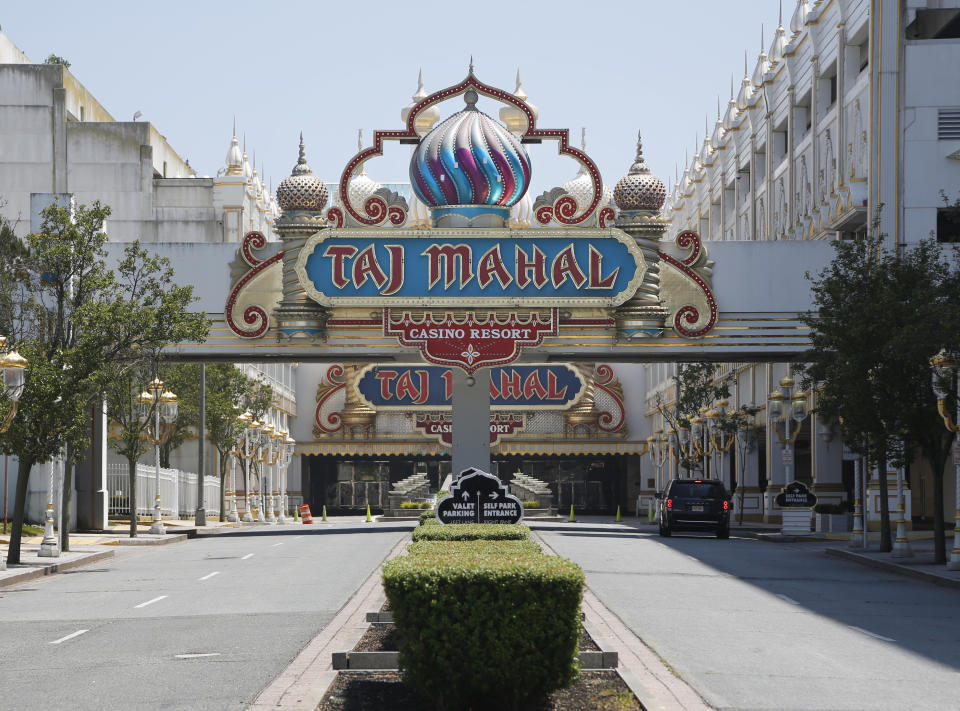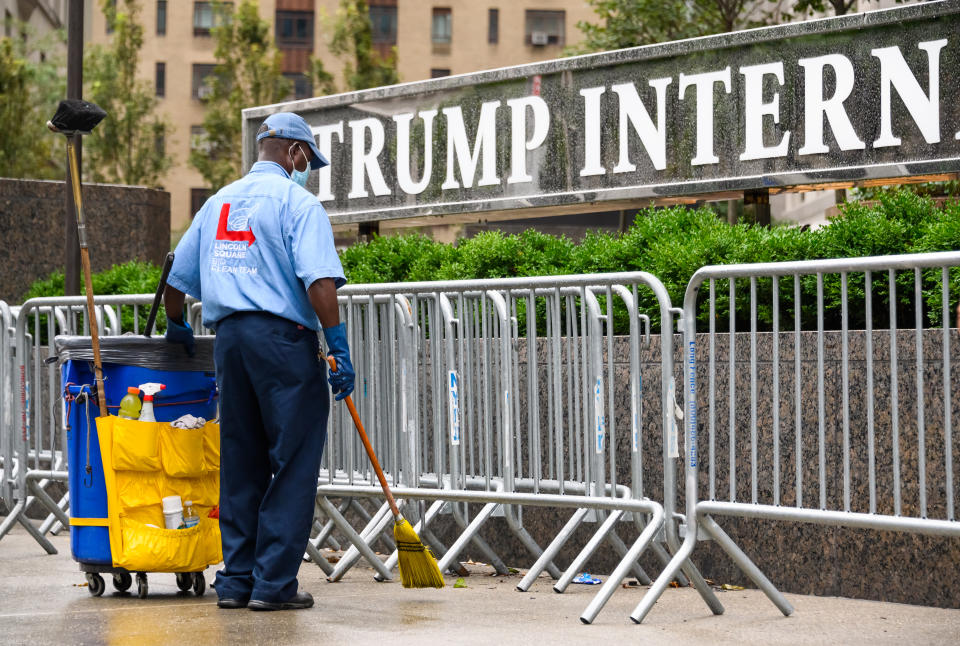We’re watching Trump’s 7th bankruptcy unfold
As a businessman, Donald Trump ran 6 businesses that declared bankruptcy because they couldn’t pay their bills. As the president running for a second term, Trump is repeating some of the mistakes he made as a businessman and risking the downfall of yet another venture: his own political operation.
In the 1980s, Trump was a swashbuckling real-estate investor who bet big on the rise of Atlantic City after New Jersey legalized gambling there. He acquired three casinos that by 1991 couldn’t pay their debts. The Taj Mahal declared bankruptcy in 1991, the Trump Plaza and the Trump Castle in 1992. Lenders restructured the debt rather than liquidate and Trump put his casino holdings into a new company that went bankrupt in 2004. The company that emerged from that restructuring declared bankruptcy in 2009. Trump’s 6th bankruptcy was the Plaza Hotel, which he bought in 1988. It went bankrupt by 1992.
Trump’s surprise victory in 2016 paralleled the arrival of the brash upstart in Atlantic City more than 30 years earlier. But in the fourth year of his presidency, the Trump operation is once again reeling. Voters give him poor marks for handling the coronavirus crisis, underscored by an outbreak at the White House that infected Trump himself. Democrat Joe Biden is beating Trump is most swing states and an Election Day blowout is possible. Trump has suggested he won’t leave office if he loses, threatening a constitutional crisis and his own political legacy.
The lessons of Trump’s bankruptcies explain much of the Trump campaign’s current tumult. Here are 5 similarities:

Trump loses focus. As a real-estate developer, Trump had a reputation as somebody who relished the dealmaking but not the everyday work of running the companies he bought. “In business, he would focus for about two or three days before the closing, and after that he would lose interest,” one former associate told the New York Times for a 2016 analysis of the Plaza Hotel bankruptcy. Trump himself has admitted this. “The fact is, you do feel invulnerable,” he told author Timothy O’Brien, author of the 2005 biography “Trump Nation.” “And then you have a tendency to take your eye off the ball.”
Winning the 2016 election was the biggest deal of Trump’s life, and he pursued it vigorously, with his “Make America Great Again” campaign that effectively targeted disaffected working-class voters who felt ripped off by corporate greed and offshoring. Trump’s 2020 campaign is vapid by comparison. There’s no unifying campaign slogan, no clear agenda for a second term, no tangible pitch to voters. Mostly, Trump just tries to bash Biden and scare voters into thinking Democrats will let criminals roam freely and tax everybody into poverty. It’s like Trump closed a megadeal in 2016 but can’t get excited about negotiating an extension in 2020.
He ignores warnings and overshoots. Trump got into trouble in Atlantic City because he didn’t know when to stop. Casinos were profitable where he bought his first two, the Plaza and the Castle. But as casinos proliferated in Atlantic City, the market got saturated and profit margins plunged. Some experts warned Trump was vastly overspending when he took on $820 million in debt to develop the Taj Mahal in the late 1980s. But Trump brushed them off and relied on his own rosy assumptions. The casino had cash-flow problems from the beginning and declared bankruptcy in July 1991, just 16 months after its lavish opening. Had Trump satisfied himself with the first two casinos, he might have had no casino bankruptcies in his career, instead of 5.

Trump’s most unregulated excess as president has been his fear-mongering and vilification. Trump could have built on the coalition of working-class voters and libertarian businesspeople who elected him in 2016 by pursuing pragmatic policies that made him seem like a problem-solver. Instead, he has relentlessly bullied his critics and blamed immigrants, liberals, civil-rights activists and other groups for getting in his way. Most critically, Trump ignored public-health experts who urged aggressive action to halt the coronavirus spread, instead trying to persuade the public everything would be fine. Trump’s coalition now seems to be shrinking rather than expanding, as his support among women, seniors and other key voting blocs crumbles.
Unkept promises. While seeking a license for the Taj Mahal in 1988, Trump told gaming officials he could lock in financing at the lowest possible “prime” rate, which was around 9% at the time. That helped him get the license, even though some officials had doubts about Trump. But Trump ended up paying a 14% rate, which contributed to the casino’s cash flow problems and its bankruptcy. Trump left hundreds of contractors unpaid as the casinos cratered, and some workers ultimately lost pensions.
As a candidate and then president, Trump promised to drain the swamp, release his tax returns, make Mexico pay for a border wall, revive the coal industry and vanquish the coronavirus by summer. Nope, nope, nope, nope and nope. As for a second term, Trump is promising 10 million new jobs, more tax cuts, a quick return to normal, and a redo on unfulfilled 2016 promises, such as a terrific new health care plan. Most politicians overpromise, but Trump does it on an almost outlandish scale.
He holds his partners hostage. Trump’s lenders lost hundreds of millions of dollars on his bankruptcies and other underperforming businesses, but they’ve often written off the losses and extended Trump even more credit, because it’s better than liquidation. One former chairman of New Jersey’s casino commission described Trump as “too big to fail” in Atlantic City: Had his casinos stopped operating, it would have devastated the local economy. So lenders and gaming officials found ways to keep Trump in business, while reducing the control he had over those businesses so he couldn’t single-handedly get in over his head again.

Dozens of Republican senators and members of Congress are now tied to Trump in the political equivalent of a banking relationship. As Trump won control of the Republican party, fellow Republicans lent him their support in an all-or-nothing bid for political dominance. When Trump was winning, so were they. But if Trump goes down, some of those will sink with him. That could cost Republicans Senate elections in states such as Arizona, Colorado, Iowa, Maine and North Carolina and give Democrats control of the Senate. If Biden wins the White House as well, Democrats would control the legislative and executive branches in a withering wipeout for Trump and his GOP allies.
Trump always gets another chance. For his many stumbles, Trump has always recovered and found new ways to advance his interests. After struggling in the 1990s, Trump pivoted his business away from development projects toward licensing and management deals. His star rose higher than ever when he became a reality TV star on “The Apprentice,” even as his casino company went bust two more times. And of course he capitalized on that fame to run for president in 2016, vanquishing two political dynasties—the Bush and Clinton families—on his way to the White House.
So if Trump loses in 2020, and suffers the type of embarrassing setback he did with his casino or hotel failures, it certainly won’t be the end of Donald Trump. He has a remarkable gift for salesmanship that always seems to lead to another deal—sometimes with former partners who soured on him and then warmed again. In 2008, when Trump was struggling to sell condominiums in his new Chicago tower, he sued the lender, Deutsche Bank, to get out of some of the loan payments. The two parties settled after two years of legal wrangling, and in 2011 Deutsche Bank started lending Trump money again. Trump probably hopes 2020 voters are equally forgiving.
Rick Newman is the author of four books, including “Rebounders: How Winners Pivot from Setback to Success.” Follow him on Twitter: @rickjnewman. Confidential tip line: [email protected]. Encrypted communication available. Click here to get Rick’s stories by email.
Read more:
Get the latest financial and business news from Yahoo Finance
Follow Yahoo Finance on Twitter, Facebook, Instagram, Flipboard, SmartNews, LinkedIn, YouTube, and reddit.
